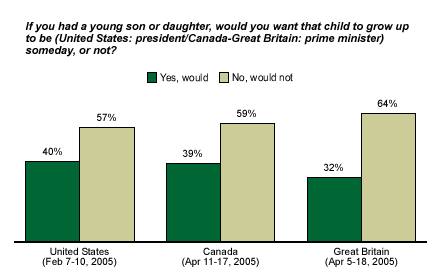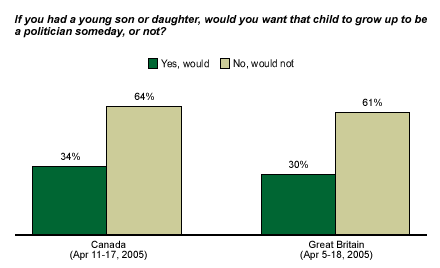British Prime Minister Tony Blair was re-elected to a historic third term in May, but with a significantly reduced majority, he faces an uphill battle. Blair continues to be lambasted for his support of the Iraq war -- with critics calling him George W. Bush's "poodle." Apparently, not many Britons would want their children to follow in Blair's footsteps. Only about one in three (32%) British adults told ║┌┴¤═° in a recent multinational poll* that they would want a son or daughter to grow up to be prime minister someday.
Opinion is slightly different across the Atlantic -- if Canadians had a son or daughter, 39% would like to see that child become prime minister, and 40% of Americans aspire to raise the future president of the United States. Still, majorities in each country say they would prefer a son or daughter not hold the highest political office when they grow up.

Britons and Canadians were also asked about wanting children to grow up to be a politician in general. Just 30% of Britons and 34% of Canadians would like to see a son or daughter become a politician someday.

Demographic Differences
In both the United States and Great Britain, there is a gender difference in opinion on this question. In the United States, 52% of men and only 29% of women would like a son or daughter to become the country's chief executive someday. In Britain, 37% of men and 27% of women feel this way. There is no gender gap in Canada.
Canadian Prime Minister Paul Martin, Blair, and Bush each suffer from mediocre job approval ratings, so one could speculate that distaste for the current leaders in each country may generate disillusionment with their offices. But in the United States and Great Britain, those who approve of Bush and Blair are no more likely than those who disapprove to say they would want a son or daughter to become president or prime minister. In Canada, people who approve of the job Martin is doing are somewhat more likely than those who disapprove of Martin to want a son or daughter to grow up to be prime minister -- 46% compared with 34%.
*Results in the United States are based on telephone interviews with approximately 500 national adults, aged 18 and older, conducted Feb. 7-10, 2005. For results based on the total sample of national adults, one can say with 95% confidence that the maximum margin of sampling error is ┬▒5 percentage points. The survey was conducted by ║┌┴¤═° USA.
Results in Canada are based on telephone interviews with approximately 500 national adults, aged 18 and older, conducted April 11-17, 2005. For results based on the total sample of national adults, one can say with 95% confidence that the maximum margin of sampling error is ┬▒5 percentage points. The survey was conducted by ║┌┴¤═° Canada.
Results in Great Britain are based on telephone interviews with approximately 500 national adults, aged 18 and older, conducted April 5-18, 2005. For results based on the total sample of national adults, one can say with 95% confidence that the maximum margin of sampling error is ┬▒5 percentage points. The survey was conducted by ║┌┴¤═° UK.
